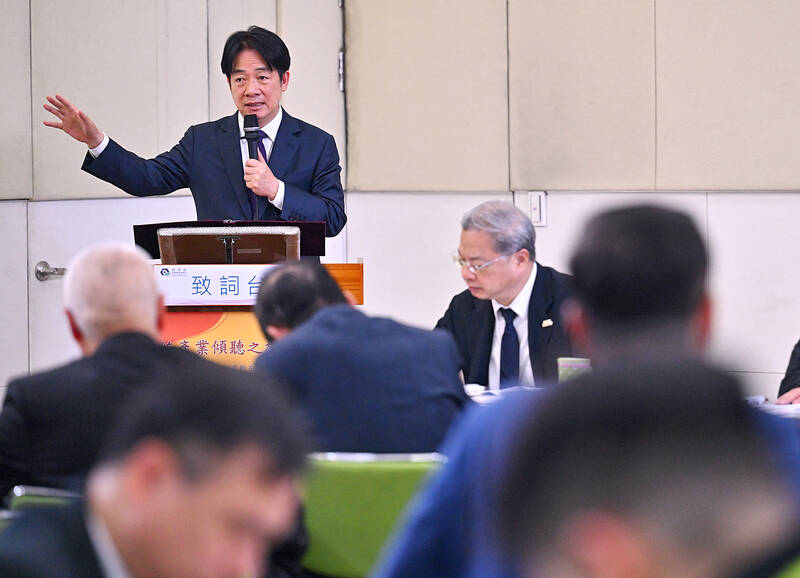No sectors would be sacrificed in the tariff negotiations with the US, President William Lai (賴清德) told a meeting with business leaders in New Taipei City yesterday, pledging to safeguard national interests and preserve space for industrial development.
His administration is taking a rigorous approach to addressing the issue, Lai said.
The interests of Taiwan’s 1.5 million to 1.6 million small and micro enterprises — which collectively employ more than 9 million people — remain a top priority, given the vital role they play in national development, he said.

Photo: Lo Pei-de, Taipei Times
New Taipei City Mayor Hou You-yi (侯友宜) said at the meeting that the government should improve its transparency, focus on stable power supply, and boost direct dialogue between policymakers and industry representatives.
Lai said that Taiwan’s power supply would remain stable through 2032, even amid growing demand from artificial intelligence and data centers.
The government is continuing to expand renewable energy sources, including wind, solar, hydro and geothermal power, he said.
The first round of tariff talks with the US has already taken place and preparations for further negotiations are under way, Lai said, adding that the government has increased its export supply chain relief package to NT$93 billion (US$2.99 billion) from NT$88 billion.
Despite downward revisions of global economic forecasts by the IMF, partly due to changes in US policy, Lai said that the outlook for Taiwan’s GDP has improved — from 2.7 percent to 2.9 percent — reflecting confidence in the nation’s economic resilience.
The IMF in a report last month predicted that Taiwan’s economy would grow by 2.9 percent this year — 0.2 percentage points higher than its previous forecast in October last year.
The IMF’s World Economic Outlook report, published on Tuesday last week, said that the imposition of sweeping tariffs by the US was “resetting the global trade system and giving rise to uncertainty” that is testing the resilience of the global economy.
Given the uncertainty, the IMF said it expected global economic growth of 2.8 percent this year and 3 percent next year, down 0.5 and 0.3 percentage points respectively from its previous forecast in January.
In other news, the Legislative Yuan’s Finance Committee and Economics Committee yesterday began a joint review of the Executive Yuan’s draft special act to bolster economic, social and national security resilience in response to the US tariffs and other challenges.
Premier Cho Jung-tai (卓榮泰) said he was glad that the Executive Yuan and the Legislative Yuan could work together to expedite passage of the bill.
Democratic Progressive Party Legislator Su Chiao-hui (蘇巧慧) said that the bill has been added to the schedule and would be discussed as soon as next week.
Provided that the opposition parties do not veto the bill or ask for a review, the review process could even be faster, Su said.

Taiwan is projected to lose a working-age population of about 6.67 million people in two waves of retirement in the coming years, as the nation confronts accelerating demographic decline and a shortage of younger workers to take their place, the Ministry of the Interior said. Taiwan experienced its largest baby boom between 1958 and 1966, when the population grew by 3.78 million, followed by a second surge of 2.89 million between 1976 and 1982, ministry data showed. In 2023, the first of those baby boom generations — those born in the late 1950s and early 1960s — began to enter retirement, triggering

ECONOMIC BOOST: Should the more than 23 million people eligible for the NT$10,000 handouts spend them the same way as in 2023, GDP could rise 0.5 percent, an official said Universal cash handouts of NT$10,000 (US$330) are to be disbursed late next month at the earliest — including to permanent residents and foreign residents married to Taiwanese — pending legislative approval, the Ministry of Finance said yesterday. The Executive Yuan yesterday approved the Special Act for Strengthening Economic, Social and National Security Resilience in Response to International Circumstances (因應國際情勢強化經濟社會及民生國安韌性特別條例). The NT$550 billion special budget includes NT$236 billion for the cash handouts, plus an additional NT$20 billion set aside as reserve funds, expected to be used to support industries. Handouts might begin one month after the bill is promulgated and would be completed within

NO CHANGE: The TRA makes clear that the US does not consider the status of Taiwan to have been determined by WWII-era documents, a former AIT deputy director said The American Institute in Taiwan’s (AIT) comments that World War-II era documents do not determine Taiwan’s political status accurately conveyed the US’ stance, the US Department of State said. An AIT spokesperson on Saturday said that a Chinese official mischaracterized World War II-era documents as stating that Taiwan was ceded to the China. The remarks from the US’ de facto embassy in Taiwan drew criticism from the Ma Ying-jeou Foundation, whose director said the comments put Taiwan in danger. The Chinese-language United Daily News yesterday reported that a US State Department spokesperson confirmed the AIT’s position. They added that the US would continue to

One of two tropical depressions that formed off Taiwan yesterday morning could turn into a moderate typhoon by the weekend, the Central Weather Administration (CWA) said yesterday. Tropical Depression No. 21 formed at 8am about 1,850km off the southeast coast, CWA forecaster Lee Meng-hsuan (李孟軒) said. The weather system is expected to move northwest as it builds momentum, possibly intensifying this weekend into a typhoon, which would be called Mitag, Lee said. The radius of the storm is expected to reach almost 200km, she said. It is forecast to approach the southeast of Taiwan on Monday next week and pass through the Bashi Channel